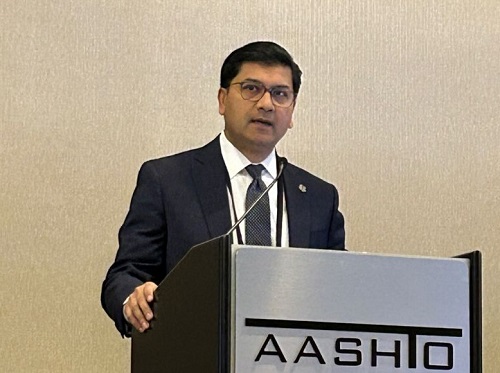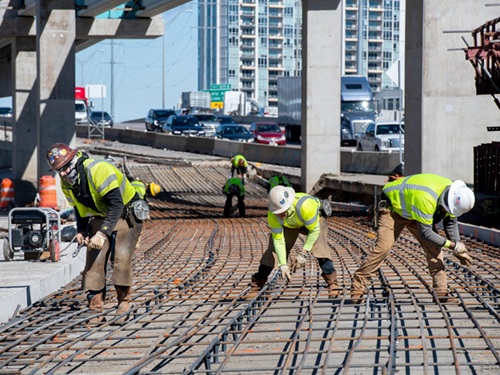Amit Bose (above), head of the Federal Railroad Administration, recently emphasized at an American Association of State Highway and Transportation Officials rail conference the importance of creating a “sustainable pipeline” of passenger rail projects for the future; an effort that is “all part of laying the foundation for a world-class national passenger rail network in the United States.”
[Above photo by AASHTO]
Speaking at the AASHTO Council on Rail Transportation 2024 Legislative Meeting in Washington, D.C., Bose stressed that delivering on the rail projects funded by the Infrastructure Investment and Jobs Act or IIJA is critical to making that “world-class network” a reality.
“That’s what we’re trying to achieve. That’s what we need to prove to Congress that we can deliver on and all of you in this room are a part of making that happen,” he said. “We are striving at FRA every day to do as much as possible to progress things as much as possible. It also has the attention of a White House that’s deeply interested in passenger and freight rail projects across this country.”

Bose noted that the railroad industry is “not going to get a bigger advocate, a stronger advocate for rail, than the President. I can tell you that because I’ve heard that from him directly, that [USDOT] Secretary [Pete] Buttigieg has heard it from him directly. But now in 2024, it’s as much about delivering these projects. It’s as much about advancing these projects.”
He emphasized that FRA is “well aware” that many of the ongoing rail projects in the country are at “different stages of development,” with many of them involving “different levels of commitment, different governance structures, and with different stakeholders involved.”
Yet Bose stressed that attention to detail – especially when it comes to discretionary grant applications –will be critical for all involved in order to help all the ongoing rail projects funded by the IIJA cross the finish line.
“If there’s a missing piece, it’s going to be exposed and it’s going to slow down a project,” he said. “It’s going to take hard, consistent work, and there’s going to be obstacles in the way. There are going to be challenges in the future to getting all of this done.”
Yet he said his agency is “absolutely committed” to meeting those challenges and advancing those projects. “We are very, very keenly and very consciously aware that we need to provide guidance to assist project sponsors in developing effective and complete projects that meet schedules and budgets,” Bose said.
“We need to point to the real impact of the [IIJA] funding and how the money is now flowing. Those funds are going to make a tangible impact on railroads and communities across the country and we need to show the public those funds are going to be used effectively and efficiently,” he added.



